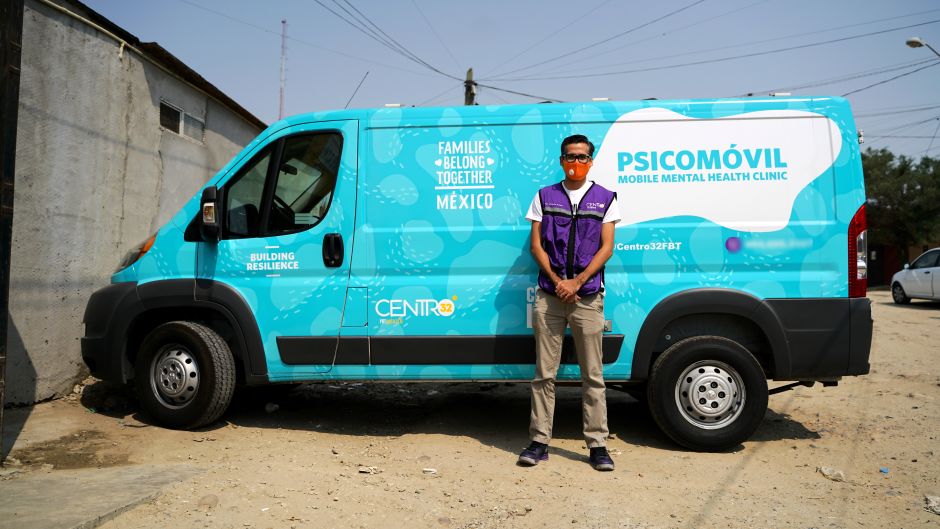They use a vehicle and attend to the needs and fears of those who wait in Tijuana for an asylum appointment
Teo, a single mother who remains in a shelter in Tijuana, Mexico, while waiting for news of her asylum application, proudly explains that she writes poems.
“This is called My beautiful Flower of the Field. It is a poem that I composed in honor of all the moms who grew up without a father and without a mother. I also have one in which I compare migrants with birds that [se vieron obligados a viajar] after a storm of problems … [Huir] of insecurity ”, the woman talks.
“I compared the migrants with birds of a thousand colors, because that’s how we are, from Central America, from southern Mexico, we are everywhere and we are of different colors, and we all come together,” he explains.
Teo and his three children, still young, have waited in the Tijuana shelter for a year for the immigration court in San Diego to give them an appointment.
“This September I have been here for one year [a Tijuana]”Recalls the native of the Mexican state of Guerrero.
The family is waiting for the court to resume the asylum hearings and then take up all the pending cases that will have to be rescheduled when the pandemic eventually and – more difficult still, the border authorities allow it. Nobody knows when it will happen.
However, Teo, far from being affected by the wait, is smiling, active. La Opinion asked him if that confidence he expresses has something to do with the visits that two young psychologists make to the shelter every week.
“Oh, I love it,” she says spontaneously. “They teach us how to resolve differences if we have them, to organize ourselves, to see what is most important for us, if the body, then the children, the work …”.
He says that when he wants to talk about something that seems confidential or very important, he goes to a little blue truck, parked outside the shelter, where he talks with the psychologist Christian Romero. And with his children, he does group work with the psychologist Estefanía Coronado.


Therapy on wheels
Both professionals collaborate with the FamiliesBelongTogether México organization.
While Romero gives individual therapy in a sky blue van-type vehicle called the Psicomóvil, Coronado coordinates team activities.
In one group it is a mother with her daughters, in another the mother shares with her children, another has a mixture of several families. The doctor projects a short video about wild animals on a screen and hands out paper and colored pencils to the families to develop topics, while everyone talks.
“They are fun activities that promote being together,” explains psychologist Coronado. “From here they go to cook together as families or do other activities.”
Unique in its kind
It should be noted that the Psicomóvil is the only project of its kind in Mexico.
It is an itinerant psychology service exclusively for migrants, as it is a vulnerable community that, after fleeing violence, encountered the phenomenon of the pandemic, confinement, lack of work for months, the anxiety of not knowing how much more is missing to ask for asylum.
It was FamiliesBelongTogether that submitted the proposal and a US organization that provided the vehicle.
Dr. Romero, dissatisfied with the job in the public sector, was hired last November to take over the project.
In the back of the van, he placed a two-person chair, a loveseat, and one of the same set but individual. This is the clinic in which she has treated single mothers who, like Teo, flee from violence with their children, some young migrant who dreams of being a rapper, one more who wants to study a university degree, among others.
“This mobile unit offers individual psychological care,” explained Romero. “We are very proud to have innovated before the need that existed months ago.”
Weeks ago, President Donald Trump’s administration changed the rules of asylum on several occasions, criminalizing and separating migrant families and making it nearly impossible to grant asylum until the pandemic hit and cases were put on hold.



In the first weeks of the Psicomóvil, Romero held workshops with groups of migrants and when he established bonds of trust, he began to give therapy in the truck.
Remember that at the beginning of the pandemic the plans changed and due to the distancing he had to carry out sessions through video calls and phone calls.
The most difficult stage of the project was “the emergence of COVID 19, when those who were working lost their jobs, they all took shelter, no one could leave, with that the loss of security, all this generated emotional crises, in some cases, there are to say it, thoughts of suicide, “recalled the psychologist.
He described this stage as one in which depression flared and thoughts of great frustration arose. Romero taught them breathing and relaxation techniques to deal with what they had to deal with and to defocus the asylum process, over which they had no control.
Now, although the pandemic continues, with the help of the Psychomobile many migrants have returned to work and place their employment among the priorities of their lives while they wait for an asylum.
“Most of the migrants are hopeful of getting it. It is [un sentimiento] very strong, very big and that helps them to move on ”, explained the psychologist.








